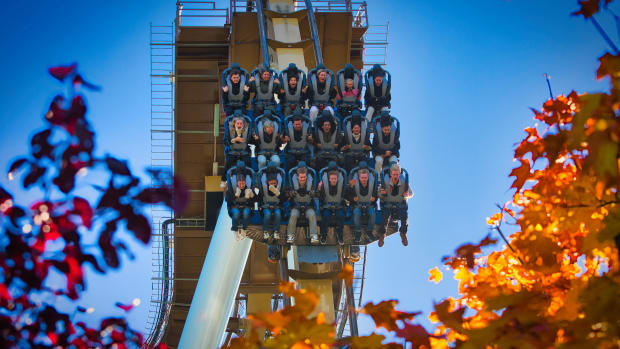
Why do we look down on having fun?
The new book by Linda Duits (48) – a social scientist at the University of Amsterdam – is a plea for fun. But how does “fun” actually work? In Leuk! the author sets out seven basic principles. “Fun is not a scarce resource.”
People who are having a great time on the dance floor – that is, for social butterfly Linda Duits (48), the best thing there is. She struggled during the coronavirus pandemic. Only when she finally found herself back in a club after a long time did she realise how important “fun” is. For her, but also for others. Yet fun has little status in our society and is easily pushed aside.

This is already clear from the low regard for the word “fun”. The term immediately suggests something easy or superficial. Duits illustrates this in her book with an anecdote from an art academy student. When he used the word “fun” – because he had enjoyed his creative process – his teacher was unimpressed. It was, she said, a “lower-secondary word”. In Leuk! (Dutch only) Duits pokes fun at that idea.
For her book, Duits interviewed thirty people whose work centres on pleasure. These fun experts ranged from DJ duo Doppelgang to erotic icon Kim Holland. Together with them, the author formulated seven basic principles of fun.
One of the seven basic principles is: fun is danger. Why?
“Both in academia and in journalism everything is approached as a problem. That’s why research into sex – which is, of course, about pleasure – so often focuses on risk. And when the media talk about social media, they always issue warnings. We’re all constantly on our phones, yet no one seems interested in what actually attracts us to them. The idea that fun is a light, easy subject, and that identifying problems is the difficult part, is a misconception. It’s the other way around: being critical is easy, pleasure is harder to grasp.”
You also introduce the term ‘three wicked stepsisters’. Who are they?
“When you have had a moment of fun, the three wicked stepsisters often show up: guilt, regret and shame. They’re hard to distinguish from one another and they often come as a trio. If we’ve had a big night out, like during ADE, we might feel guilty for having used drugs. Perhaps we also feel regret, because we’re sitting in a lecture with a cotton-wool head from the hangover. Or we feel shame about how we behaved. But those negative emotions are useless. I hope people will start to enjoy their own fun more.”
Fun should be shared: agree or disagree?
“Agree. Sharing multiplies it – that’s the fourth principle. When you share fun, it grows exponentially. Several people I interviewed for my book used the word ‘magical’ when talking about fun. One of them was a theme-park consultant. I found our conversation so moving that I almost cried. He explained that the importance of sharing is built into the design of attractions: you must be able to see each other. A good example is the white-water ride, the Piranha, in the Efteling. In those spinning boats you can see your own group as well as the people in the other boats. If someone gets soaked by a wave, everyone else finds it funny too. Fun connects us: it is very hard to dislike someone with whom you are having a good time.”
A slightly deeper question: how do you place the importance of fun within our current society?
“We are, of course, living in a time of crisis – a period of hyper-individualism. In my view, that’s due to the disappearance of traditional forms of community, through secularisation. I’m not religious myself, but I did speak to a minister for my book. Because the sense of community that people used to find in church has more or less vanished, an ‘everyone for themselves’ mentality has emerged. I notice that people begrudge each other fun, as if it were some sort of zero-sum game: if one person has fun, the other person somehow doesn’t. Former minister Faber, for instance, did everything she could to sabotage a small outing for a group of underage residents of an asylum seekers’ centre. As if the fun of asylum seekers would come at the expense of that of the hardworking Dutch citizen. But fun is not a scarce resource. That idea worries me. I think it’s important that we don’t all retreat into our own bubbles. And that we, for example, still make small talk with the proverbial baker. In my view, life is about having as fun a time as possible with the people who matter most to you.”
Still, you say in your book that there is a limit to fun…
“The seventh and final principle of fun is indeed: without an ending, it’s not fun. Wanting more, more, more eventually gives us less fun. I still struggle with that, to be honest. I personally never want fun to stop. I still have bedtime issues, even though I’m almost 49. Staying up late is just so much fun. And when I’m at a party, I never want to go home. But a fun activity, unfortunately, always comes to an end. That’s simply how fun works. If you listen to a song you love on endless repeat, it eventually stops being enjoyable. A party that is stretched on and on becomes less fun too: the mood shifts and people get too drunk. Luckily, a fun activity pays out at several moments: beforehand, during, and when you look back on it. The chapter ends with: It’s fine, there’s always another day. Fun never truly stops. Those sentences are also really a message to myself.”
Linda Duits, Leuk! (Amsterdam, 2025), 224 pages. Price: €23.99.


